| Cover
Story
The plane of Light

Nearly 37 million people worldwide are blind. 28 million of them can get their sight back. Ninety per cent of the blind and visually impaired people live in developing countries where access to quality eye care is limited. Blindness or poor vision can mean never going to school, never raising a family of one's own and living with the constant feeling of being a burden to others.
The most important issue to address is that around 75 percent of this blindness are preventable. Lack of awareness is the primary factor that leads to complications of ophthalmic diseases. A cure is often simple and inexpensive, but in many areas even basic medical help is out of reach for those who need it most.
With the aim of reaching out to the most vulnerable, ORBIS was created. A plane carrying eye doctors, nurses and technicians to restore the sight of millions of people, free of cost, bringing back hope into their lives is nothing short of a miracle. Bangladesh being one of the priority areas for ORBIS's sight-saving programmes has also reaped the benefits of this remarkable endeavour to bring people out of the dark. Tareq Salahuddin
The ratio of ophthalmologists and population in Bangladesh is 1:200,000, which means that there is only one eye expert for every two lakh people in the country. 300 ophthalmologists, out of around 700, are stationed in four big cities in Bangladesh. A 2003 survey jointly conducted by a UK-based medical institute and the National Institute of Ophthalmology in Bangladesh revealed that 1.53 percent of the population aged over 30 years have been suffering from blindness.
There are 626 ophthalmologists working in 141 hospitals across the country out of which 272 of them are based in Dhaka and the rest across the country. Many of them are not trained in microsurgery and do not perform surgery.
Hospital based eye care services are provided by 141 eye hospitals/departments in the country, 50 percent of which are in the government; 40 percent NGO and the rest in the private sector (10 percent). The government sector is the largest healthcare provider including eye care in the country. Eight eye hospitals including one in the government sector have paediatric eye care services established during the last five years.
All ophthalmic equipment or instruments are imported. Medical supplies and ophthalmic equipment are inadequate and facilities lack maintenance personnel. Throughout the country, cataract treatment are being developed, however, there is little sub-specialisation with few ophthalmologists having had any fellowship training. The lack of sub-specialty training could be attributed to the lack of standardisation of ophthalmology training and the lack of training opportunities within the country.
There are 40,000 blind children in the country and the leading causes of blindness are cataract and corneal diseases while the most common cause of low vision is "error of refraction".
Bangladesh has one of the highest prevalence of blindness in the world, a fact in big part
 |
The on-board lecture room |
 |
Local doctors get hands-on training on-board |
owed to lack of awareness and education on eye care issues amongst the general public, and the rural population in particular. Inspired by the global need, ORBIS -- an international non-profit humanitarian organisation -- launched their international blindness charity with a unique Flying Eye Hospital in 1982. They are committed to preserving and restoring sight in the developing world through hands-on training of medical personnel and by strengthening the capacity of in-country eye care services and institutions.
Since then, their highly skilled volunteer medical staffs have trained over 93,000 local medical professionals in more than 80 countries. These trainees have gone on to share their new skills with others and it is estimated that as many as 22.5 million blind or visually impaired children and adults have now benefited from the multiplier effect of ORBIS programmes worldwide.
ORBIS International is focusing their resources in five priority countries -- Bangladesh, China, Ethiopia, India and Vietnam. ORBIS is also a founder member of Vision 2020 global initiative for elimination of avoidable blindness.
ORBIS is better known for its Flying Eye Hospital aboard in a DC-10 aircraft that flies from country to country to serve its charity mission. At the heart of ORBIS's sight-saving work is the Flying Eye Hospital, a DC-10 aircraft converted into a state-of-the-art teaching facility.
The Flying Eye Hospital carries a laser treatment facility and an operating room where doctors participate in surgeries performed by volunteer surgeons.
This unique aircraft is flown by volunteer pilots to developing countries, where the 25-
 |
(Left) A young boy who got his sight back after surgery in the Flying Eye Hospital. (Right) Abdur Rahim considers the surgery that cleared his blurry vision, an act of God |
member ORBIS medical team and visiting volunteer doctors perform surgeries and train local ophthalmologists. The world's leading surgeons donate their time to perform surgery and teach abroad the Flying Eye Hospital, while nurses and technicians also provide training for their local counterparts. On board is an international team of dedicated health professionals from more than a dozen countries, working together to eliminate unnecessary blindness around the world.
The Flying Eye Hospital visits a country by government invitation and, in conjunction with the local medical community, tailors an ophthalmic programme to local needs. Many heads of state, ambassadors, ministers of health and other government officials have expressed their admiration and support for ORBIS's programmes and its active diplomatic role.
During each programme, host country doctors select patients for surgery for the purposes of teaching. Local doctors, nurses and anaesthesiologists work alongside the ORBIS medical team to perform surgeries in the onboard operating room. To maximise the impact of each surgery, procedures are broadcast live to the monitors in the adjacent classroom and, if needed, to auxiliary classrooms. Large numbers of trainees can then observe the surgeries and are able to ask questions of the operating surgeons via a two-way audio-visual system.
ORBIS has a number of strategies to combat preventable blindness. Apart from training
 |
| Gordon R Douglas, MD, Medical Director, Flying Eye Hospital |
 |
| Drew Boshell, Director, Flying Eye Hospital |
 |
| Dr Khairul Islam, Country Director, Bangladesh ORBIS International |
eye-care professionals the organisation introduces health-financing systems and provides state of the art ophthalmic equipment and related management systems. It also tries to raise money internationally and influence governments to adopt policies that will make significant reductions in the number of people who become blind. The first ORBIS flight to Bangladesh was in 1985 when this amazing flying jet visited Dhaka. Since then the Flying Eye Hospital has visited Bangladesh eight times (including this year's visit) to conduct sight-saving operations and share modern eye care techniques with local doctors and other eye care professionals.
The ORBIS Bangladesh country office was established in 1999 with the goal of preventing avoidable blindness in the country by ensuring sustainable, equitable and available eye care services for everyone. Currently they have 15 long-term projects in place to build hospital capacity for eye patients and to increase the public awareness of the available treatments for avoidable blindness. Volunteer doctors supplement these projects and nurses visiting local hospitals to conduct intensive medical training programmes, in which they share and develop skills.
Since the establishment of country office in Bangladesh, ORBIS has trained 380 doctors in different ophthalmic subspecialties, including paediatric ophthalmology, cataract and glaucoma. Over 230,000 eye patients have been medically treated and 12,000 eye surgeries have been performed by ORBIS partner organisations. Through their focus on childhood blindness they have successfully established four paediatric eye centers that provide quality service to children throughout Bangladesh.
There are various programmes of ORBIS in the eye care sector of our country. This includes developing paediatric eye care capacity in the National Institute of Ophthalmology (NIO), developing training capacity of Islamia Eye Hospital, strengthening
 |
The reception of the Medical team of Flying Eye Hospital |
eye banking capacity of Sandhani National Eye Donation Society (SNEDS), focusing primarily on paediatric eye care and establish paediatric eye care capacity in Dinajpur, strengthen the eye care capacity of the Chittagong Eye Infirmary and Training Complex, strengthen hospital cataract service uptake of Khulna BNSB Eye Hospital, strengthening paediatric eye care and cataract services in Moulvibazar BNSB Eye Hospital. ORBIS, morover, plans to set up ophthalmic para-professional courses in Bangladesh and establish health insurance for eye care for the poor. It aims to eliminate cataract from Manikganj district through demand-side financing, and to integrate primary eye care in urban primary health care in Bangladesh. The two-week programme started on 20th November this year was the ORBIS's 8th Plane Programme in Bangladesh as part of their world-wide humanitarian mission in the field of ophthalmology. This time the plane was stationed at Chittagong Airport.
The programme is aimed to create public awareness, which is so vital to improve the situation, alongside the transfer of technology and sharing of experiences.
The organisers informed that ORBIS plans to conduct the flying eye hospital programme at Osmani International Airport in Sylhet during its next visit in Bangladesh and gradually at other places of Bangladesh if the concerned airport authorities provide the facilities and other prerequisites.

Ongoing surgery on the plane that has restored sight to millions* |
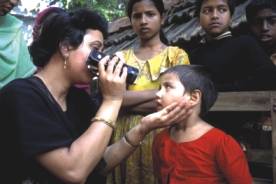
Routine eye check-ups in rural areas is part of ORBIS's strategy to reduce preventable blindness* |
Besides treatment and carrying out surgery on some pre-selected patients, the team held training, lectures, symposia, and surgical demonstrators for 150 participants, including 64 ophthalmologists of the country.
The Chittagong Eye Infirmary and Training Complex (CEITC) and Ophthalmological Society of Bangladesh, Chittagong branch, hosted the world's only flying eye hospital and ORBIS's most technologically advanced training programme in Chittagong this year.
The CEITC is a long-term local blindness prevention partner of ORBIS Bangladesh Country Programme. There was a two-week nurse-training programme on the flying eye hospital.
ORBIS brought one of the world's most expensive and latest ophthalmic equipment -- the vitreoretinal simulator machine, to train local doctors. The total service offered by ORBIS
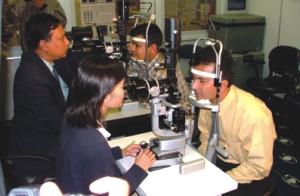 |
On-board consultations with eye experts |
during their plane programe such as operations, treatment, and training is completely free of cost. It is indeed a blessing for our doctors and patients to have the opportunity to avail these facilities. ORBIS Bangladesh Country Director Dr Md Khairul Islam says that the ORBIS Flying Eye Hospital is a true harbinger of hope for the Bangladeshi ophthalmic community that is struggling for quality service delivery.
He said the hallmark of the ORBIS programme in Bangladesh continues to focus on paediatric ophthalmology, the strengthening of eye health centre capacity and supporting community outreach in rural areas. The on-board surgeries, says Dr. Khairul, attract more attention and gives emphasis to the need to raise awareness to prevent blindness. The issue gets more importance by the occasion. Moreover, this way ORBIS can bring the ultramodern equipment from country to country by the Flying Eye Hospital. Besides, during the on board surgeries, local doctors get the opportunity to know the newer techniques of surgeries.
Dr Gordon R Douglas, Medical Director of the Flying Eye Hospital during this year's Flying Eye Hospital visit in Chittagong informs that this year, they emphasise on retinal surgery, corneal surgery, laser therapy, and paediatric cataracts. He stresses that the eye care facilities and availability of the ophthalmologists must be decentralised throughout the country, otherwise it is impossible to provide uniform healthcare. But he opined the progress in the respective sector of our country is satisfactory. He urged making awareness through media to combat the disease burden.
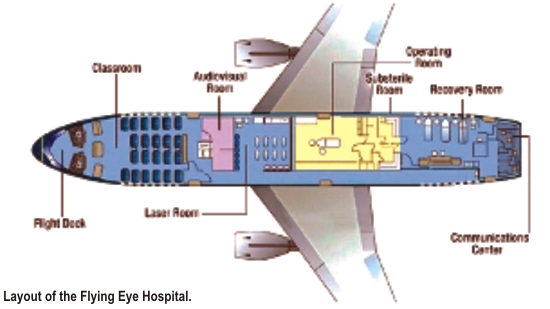
Abdur Rahim, 30, from Fatikchhari of Chittagong had been suffering from blurred vision for the last one month due to lens dislocation. He visited several local ophthalmologists but had no hope for cure. At last he was selected for the surgery on the Flying Eye Hospital. He considers this surgery a gift from God. There are so many stories like Abdur Rahman who was cured by the treatment by the foreign doctors during the visit of Flying Eye Hospital, who could not even think about going abroad for their treatment.
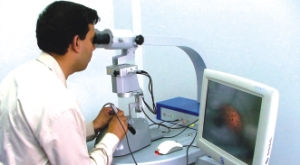
The state-of-the-art vitreo retinal simulator |
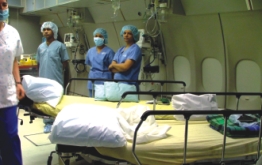
Inside the plane is a fully-equipped operation theatre |
The contribution of ORBIS to combat blindness and restore sight in our country is enormous. Considering the current situation of our country in the eye care sector, ORBIS is a blessing for us. The mission of ORBIS will be successful indeed, if we can fight avoidable blindness from our country by making proper awareness. In fact, this can help a lot to restore sight at the least cost on a large scale.
*Photos: Orbis International Copyright
(R) thedailystar.net 2005 |
